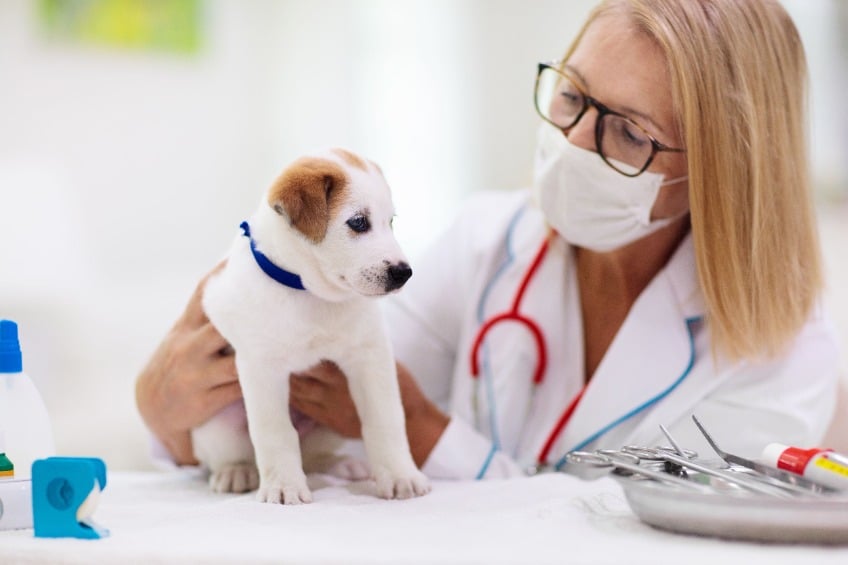The Skinny:
People love their dogs. Since there are about 80 million pet dogs in the U.S. alone, that’s a lot of love. But, of course, love can hurt, and it can also kill if pet owners feed their pooches the wrong stuff. What makes this particularly confusing is that many of the foods people love to eat pooches should avoid. Plus, furry friends are bad at making healthy food choices, as they eat about anything in front of them. Take heart, WellWell has pulled together a list of things dogs shouldn’t eat. Mistakes happen, and if they do, call a vet immediately or check in with the ASPCA’s Animal Poison Control Center.
The Slate:
No Joe or Caffeine
A tiny hit or lick of coffee shouldn’t ring alarm bells. But a pooch munching on tea bags, coffee grounds or caffeine pills can lead to deadly consequences. In less than a couple hours, dogs will likely start vomiting or having diarrhea to get rid their body of these toxins. Excessive barking, hyperactivity, elevated heart rate, muscle tremors, seizures, and worse can also follow.
Can’t Do Chocolate
Chocolate holds theobromine, like caffeine and as dangerous. Just 200 milligrams of theobromine per kilogram of canine body weight can be fatal. Dark chocolate is deadlier than other chocolates. Vomiting, diarrhea, increased thirst, panting, and excessive urination—all symptoms of chocolate ingestion—usually start 4 to 24 hours after ingestion. Increased heart rate, tremors and restlessness are also common. The best advice is to get the dog to a vet within two hours.
Never Macadamia Nuts
Macadamia nuts are extremely dangerous for dogs. Just one-tenth of an ounce per 2 pounds of body weight can result in serious health problems. Symptoms include muscle shakes, vomiting, elevated temperature and weakness in the hind legs. Vomiting helps relieve symptoms quickly, but on the flip side, pairing macadamia nuts with chocolate can be fatal.
Xylitol—The Artificial Sweetener
Dogs may not get this directly because it is in diet candy, chewing gum, toothpaste and baked goods. Xylitol isn’t great for people either, as it can lead to bouts of diarrhea. Unfortunately, it has a faster impact on dogs, leading to rapid insulin release that reduces blood sugar in as little as 10 minutes and usually not longer than an hour. Symptoms include lethargy, vomiting, coordination problems, tremors, seizures and even comas and liver failures. Avoid inducing vomiting. Instead, get the dog to a vet as soon as possible.
Scrap Grapes and Raisins
Tartaric acid in grapes and raisins is dangerous to dogs. Too much can cause vomiting, excessive thirst, diarrhea, sluggishness, depression and kidney failure.
Garlic and Onions
Raw, cooked, powdered or dehydrated—garlic, onions and alike are toxic to dogs. The n-propyl disulfide in these products effectively kills red blood cells, causing anemia. One gram of garlic per 5 pounds body weight or one gram of onions per pound of pooch can create problems. Symptoms are trickier to notice, but include pale gums, weakness or elevated heart rates. Usually, rest and a healthy diet led to recovery.
Don’t Throw a Dog A Bone
Skip old clichés and bones. They usually aren’t good for a dog’s teeth and can create even more problems for a dog’s digestive tract. Large bones can create blockages, and smaller pieces can be brittle, leading to splinters and lacerations in the digestive system. Raw or recreational “bone” products may be safer, but it is best to avoid them altogether.
Eyes Up:
What is your doggie no goes? Let us know at info@wellwellusa.com.
WellWell editors independently identify services and products of interest. If readers purchase anything through the associated links, WellWell may earn a commission, which goes to support our work. Learn More.










